“The best way to win,” eh?
Sneaky Ferrett — This is a trick theme; it’s not about Magic at all!
A few clicks and keystrokes later…
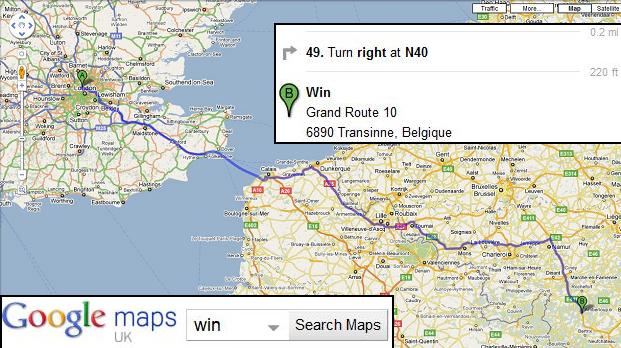
JOB. DONE. Â
Shame I don’t own a car anymore, I guess. Also it’s highly unlikely Ferrett, or you, would start at the same address as me. I think I would’ve noticed if you lived here also. We coulda played some games or something.
Hmm.
This probably doesn’t count as content now does it?
I guess I’ll quit wasting time and actually write an article then? Okay, here goes:
Your mum was flat wrong, back when you were a kid and she told you,
“It’s not about the winning, it’s about the taking part.”
Of course it’s about winning. Everyone wants to be a winner.
The thing is, what she meant by ‘winning’ there, and what ‘winning’ should mean to you, are two different things entirely.
A lot of the time, we’re in a Magic tournament, and ignoring draws, for each round you play, there will be a winner and a loser. The winner is the person who gets three points and feels good about herself. The loser gains no points and is disappointed. This is the structure of the events we play in, where only 50% of those involved in each match can come out positive.
This sucks.
It’s also why I’d like you to stop thinking about Magic as a zero-sum game all the time. If we don’t always use such a narrow definition of what it means ‘to win,’ the one your mum used when your football team got destroyed, we can play and both be winners.
Wouldn’t that be good?
Q — Okay, so what is winning, then?
A — Winning is whatever gives you and those around you the most satisfying experience during your time with Magic. And the “best” way to win is whatever you find you can do to maximize this enjoyment for all.
Here are just a few ways I’d recommend you choose, to ‘win’ at Magic in future.
Additional Challenges
Once you know you’re out of contention, if you don’t mind sacrificing a few rating points, you can ignore all the good advice you’ve previously read or given others, and impose some additional challenges or tasks on yourself for fun. This might be in the games themselves, say, seeing how many times you can ultimate Jace, the Mind Sculptor, or by finding something interesting to do with your precious time between rounds.
Tim Willoughby (of coverage fame), as well as being our personal bottomless supply of ‘Untold Legends’ stories, seems to always have one or more such challenge on the go at tournaments. At a PTQ a couple months back in Reading, we found ourselves at two losses after round 3 or 4, almost certainly out of Top 8 contention — so Tim suggested we accordingly “make things a little more interesting”… By leaving Eclectic Games, going to the pub round the corner, and downing a
Jägerbomb
after each round.
Of course, I was in, and we skipped off down the road with twenty minutes left before our next matches.
At the end of the following round, Quentin Martin asked what we were up to:
“Going for Jägerbombs at the pub. After every round.”
“Alright, I’ll have some of that.”
“Wait, how long have we got?”
“I dunno, five minutes?”
“It’ll be fine.” We sprinted out the door.
Come the final round, I was 3-3, Tim 4-2, both of us fairly buzzed, having not eaten since breakfast. When I say buzzed here, I mean to the extent that I said spending £11 on a yo-yo was “the best decision I’ve made this year,” after somehow resisting the lure of Pokémon theme decks. The front of that store is a gold / landmine for the tipsy gamer.
In addition to the effects of the alcohol, Tim not being a veteran caffeine addict like myself (his drink of choice earlier that morning being Japanese-pro favorite
Pocari Sweat
) had been hit pretty hard by the Red Bull. He was visibly shaking and could barely sit still. His opponent took this as nerves at having a super-outside shot at Top 8, but the reality was that Tim was only just managing to hold back laughter from the absurdity of the situation. He barely kept it together when his opponent led with a fetchland after his turn 1 Suppression Field, while I couldn’t concentrate at all on my game, impatient and wanting to play with my new yo-yo, so obviously lost.
Afterwards, Tim led us to a fantastic little pie shop called Sweeney and Todds for a delicious dinner and more drinks as the caffeine jitters faded — it is only now, seeing it in daylight on Google Street View that I realize how worryingly located it is…

Imposing additional challenges on yourself like this can be a good way to stay in a tournament when you’re out of the running and still have some
fun winning in another way. Alternatively, for the Spikes in the audience, I’ve heard such challenges being useful for players who find they win
too easily.
I’m in no danger of this myself, but if you’re the ringer in your store full of new players and aren’t getting
much joy out of your games, why not force yourself to win using a
niche
draft
strategy
or with an off-the-radar Constructed deck?
(
I will embarrassingly discredit my
previous advice
somewhat now, by admitting that Tim finished in 9th place at 5-2 at that PTQ. It must have been an outlier.)
Deck Design And Theory
Not everyone is cut out to be a top-tier tournament player, but some possess such an innate ability to understand the game, or are so well able to analyze a metagame and plan accordingly, that they can make valuable contributions in the field of deck design or theory. Mike Flores is a prime
example of someone who is better known for their wins in theory or deck design than in the games themselves (see:
“Who’s the Beatdown,”
or Andre Coimbra Worlds-winning Naya Lightsaber list).
Even if you aren’t up to this standard and aren’t the person who can finely tune a rough brew to huge tournament success or give a stunning new take on card advantage, many of us still have initial good ideas or a little piece of tech now and then. And if someone else can take your idea to success, whether suggested to them or thought of independently, then you should absolutely take that as a small win and pat yourself on the back.
Take for instance American deck designer/player @smi77y, who you may recognize if you’re as keen a Twitter user as I am. He’s recently taken several interesting and powerful homebrew decks into MODO Daily Events with which he and others have seen success copying, e.g. his G/W Tokens list (
the third 4-0 deck here
). I (very briefly) asked him about the pleasure he gets from seeing others win using his decks, and I think his view illustrates well the ability to win through the success of others using your ideas.
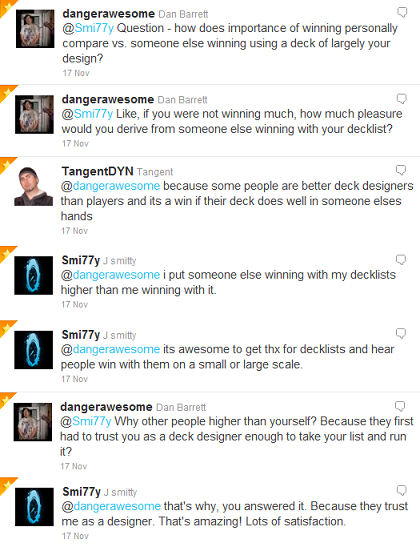
Or, for a more personal example: After M11 came out, I suggested to some friends running a Sylvan Ranger in Fauna Naya decks, as I was having occasional trouble getting the right sources, or my third/fourth land drop, which cost me games. I wouldn’t go so far as to say I got laughed out
of The Games Club for this, but it was certainly referred to as “far too cute” by most. Now look at Joe Jackson’s
winning list
from G/B Nationals. My “cute” idea from weeks back having also been thought of by the winner’s testing team certainly eased the blow of my own poor performance ever so slightly!
Trading Â
Be it in monetary value terms, getting the last card you need to complete a deck, or some foils, foreign cards and promos to pimp out your cube, finding a way to win through trading is an easy task. It’s a game that will always be 100% winners too, as both parties should always be happy with the swaps you’ve arranged.
The best way to win through trading? Be sociable! The more people you approach with your binder and get talking to, the greater the pool of cards you potentially have access to. Which is especially important if you’re after something particularly unusual or of high value — everyone has a spare Venser’s Journal, but finding someone with spare original dual lands or a Spanish Inquisition of Kozilek will take some work.
At this Saturday’s PTQ, my performance was less than stellar, 2-2 dropping with what was widely considered a weak pool. But, not only did I manage to build it to within three cards of “correct” (a massive deck-construction win for me!), I did a whole load of winning on the trading front. Here’s what I picked up:
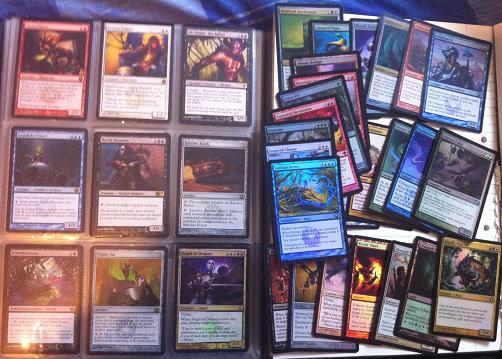
In the process, I got rid of a Karakas I was never going to use (to Ben, who needs it for Legacy Enchantress), my fifth copies of several SOM duals, some signed Liliana Vesses, and other assorted cards I wasn’t going to need any time soon, to go into various people’s EDH and Standard decks. The Bitterblossom completes my playset should I play Fae next Extended season; the Mimic Vats and Ratchet bomb give my U/B deck more fuel, and the Angel of Despair goes straight into Legacy Dredge. Plus, all of those foils increase the pimpness of my common/uncommon cube from 28.7% to 32.7% — still a lot of winning left to do there!
Other Formats And Games
Whether to wind down at the very end of a long and successful day, or when some of your crew embarrassingly Redshirt (
0-2 drop, remember?
) out by lunchtime, I recommend always having a “fun” format deck or other game in your bag. EDH is a pretty safe bet (just so long as you’ve not built it
too cut-throat and Spikey —
Sheldon Menery
 isn’t the only person that doesn’t like that), but a cube of some kind is better — it supports multiple players straight out of the box without requiring that they’ve remembered to bring their own decks. Goofy new brews you want to try in unsanctioned matches are also worth packing.
Non-Magic games are also a good idea, particularly if you’ll be joined by friends who don’t play Magic much, or you won’t have enough
time for a full cube draft or weeklong four-player EDH game. Dominion and
Ascension
(which I’m issuing a
strong buy
recommendation on, 25 notes
extremely
well spent) use similar mechanics to drafting in Magic but are easy enough for the layman to pick up and can be played in
twenty minutes at a push. Or for a complete break from cards, PT-choice winner
Catchphrase
doesn’t require any shuffling and is even easier to pick up.
A favorite here in London is For Sale. You’ve probably never heard of it though; it’s pretty underground (so
here’s a link
). Around Nationals last year, we stopped playing Magic to play 3v3 team For Sale exclusively for about two weeks. In fact, we were so obsessed with it that we even re-appropriated the feature match areas at Nationals itself to play the far more important For Sale feature matches, which were definitely not played for a quid each a round. No sir. (Hit me up at GP London next year for a round or two.)
Another much-loved game in our group is “Heads or Tails.” A poor man’s version of the “credit card game” for two players, you flip a coin, and the winner keeps whatever stake was anteed. The skill lies in peer pressuring your friends to play when you have money to burn and they don’t (or for compulsive risk-takers, the reverse). After the Zendikar Prerelease, Gary came outside to the bar and demanded a game for 50p. I won this, then several more in a row, before the stakes were raised to new rares worth about a pound each from our folders. I won all but one of these as well, which stressed him out no end. He clearly couldn’t afford to lose any more, so naturally carried on playing and demanded higher stakes.
“Last time. Heads or Tails for… a Misty Rainforest!”
“Like you even have one of those you haven’t sold for beer money.” I called, but he showed me the last two Zendikar rares in his folder (both the U/G fetch), and I couldn’t back down at this point. “Go on then. Tails.”
He flipped the coin into the air; it landed tails. Gary started flapping and spouting about how unfair everything was and asking for ‘double or quits.’
“No more, Gary. I’m bored of taking your cards now.”
Knowing when to stop playing is a valuable skill.
Railbirding
I might not have warmed to the term yet, but I still think this is a pretty good place to be in the final round of the Swiss, if you’re not lucky enough to be on the top tables yourself:
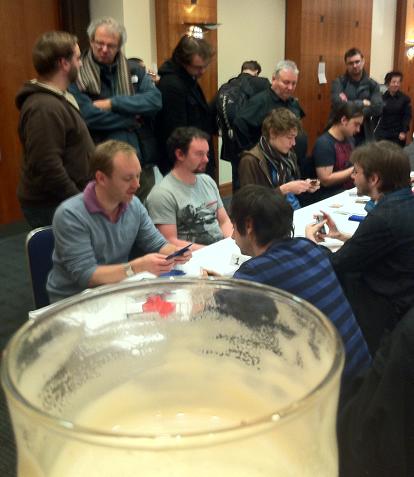
In addition to my fine choice of beverage (a luxury only afforded to superior British players), note the fine caliber of gentlemen in this shot: fellow #scgsearch competitor Tom Reeve, Quentin Martin, and Tim Willoughby. Also Rob Stanjer (sitting down, with scarf), having briefly returned to Magic to Top 4 this 110-player PTQ with no knowledge of the format, before returning to a mystery location in North London.
When you get to spend the later part of the day watching and chatting with players like this, it almost seems foolish to have entered the event yourself. Seeing these games can provide a lot of learning as well as laughs for you, the spectator, such as Rob offering his opponent multiple handshakes before he finally conceded in game two. Spending time with friends and like-minded people is supposed to be fun, so enjoy it!
Plus, if you rack up enough hours on the rail to qualify for admission, you may even be invited to join Sam Stoddard and co.’s elite: The American Railbird Association.
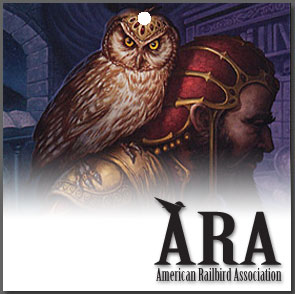
Judging
I personally don’t understand why you wouldn’t want to be playing a game of some sort at a Magic tournament, working hard and long hours purely to assist those who are. However from chats with various stalwarts of the UK judge community, I’ve learned it is more rewarding than it might sound — and has to be really, considering the fairly meager “pay” in terms of foils/product. While I’m still not convinced and won’t be joining their ranks anytime soon (and neither am I selling it at all well here, sorry!), it might be a worthwhile option for you. If nothing else, I’m sure it couldn’t be the worst thing for a young person to add to their CV/resume — it shows leadership skills, ability to work in a team, and other such desirable attributes, all outside of work/school to boot!
You can also help the Magic player base as a whole win by assisting judges in spotting cheaty scumbags trying to ruin everyone’s game. For example, on Saturday, I reported to the Head Judge someone who repeatedly tried to activate a Spikeshot Elder with only one red source and who was looking at the bottom card of his opponent’s deck at every shuffle. Already DQed in an earlier PTQ this season for adding five removal spells to his pool, I’m sure you too look forward to hearing of his lengthy ban following the current investigation.
Writing
While this may be an activity that takes place outside out of the events themselves and is a world unto itself, the rewards that come from writing are in no way linked to your tournament performance. Winning a tournament doesn’t guarantee a good report will result and neither does a poor finish preclude an excellent story being told. When writing pays off for you, it may not do so immediately (save the satisfaction of having crafted a good sentence or reading the completed article back in your head) but can turn even the most miserable day of Magic into a smile on any number of faces including your own.
Since entering this competition, I feel I’ve won every time someone has clicked “like” or voted for me, every time someone has said they enjoyed reading an article, or asked me when the next one will be up. Being able to carve your thoughts, feelings, and memories into something others can enjoy or even learn from is a very powerful and satisfying thing indeed.
Geordie Tait recently wrote in his
advice to other Magic writers
that
“if you’re consistently interacting with the community in a manner that makes you miserable, you should switch it up.”
— I’d suggest that a similar statement could be applied more broadly to Magic, and the rest of our lives: if you’re not getting what you want out of Magic/your relationship with friends or family/etc., consider approaching it in a different way.
Not getting along with your flat mates or parents? Perhaps you shouldn’t start every conversation by nagging about a bill that needs paying or asking to borrow money. Not having as much fun at Magic tournaments as you used to? Consider how you’re seeking to enjoy them and take an EDH deck, copy of Ascension, or your trade binder next time — just in case.
It’s up to you whether or not you win at Magic. Ignore your mum, choose a different definition of what it is to ‘win,’ and you can always ‘get there.’ I’ve suggested a few ways you might win above, but there are so very many more — doing coverage, card alterations, and teaching new players are just three I didn’t have time to write about here.
Still feel like you’re not winning at all? Look back to when you played your first game. There was no bitching that you “got screwed” out of a Top 8 slot, or scrambling around frantically for the last few cards for your deck during the player meeting. It was so much simpler then. You, a friend, and two fairly random piles of well-thumbed cards. There was no losing, you’d won by finding a new and exciting game to play and learn.
Remember that first time on the next occasion you’re feeling a little hard done by.
Oh, and be nice to your mum. She’s right all the rest of the time and was probably the one who bought you that first Starter deck. And has almost certainly driven you to events, let your buddies stay over, or bought you fetchlands as a Christmas present (thanks Mum!).
Thanks for reading, and happy Thanksgiving, American readers!
Â
